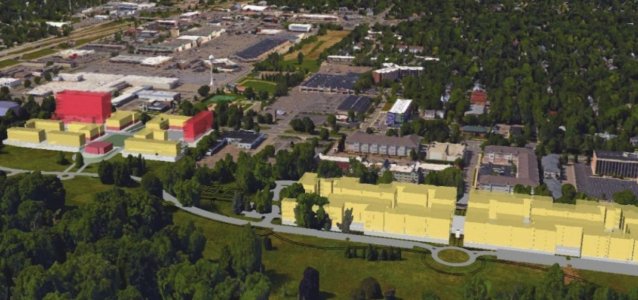
The developers of the Red Cedar Renaissance project on Michigan Avenue in Lansing may seek about $35 million in bonds funded through Ingham County for construction of the elaborate infrastructure needed to raise the proposed mixed-use building above the Grand River floodplain.
“They have a better credit rating than the city of Lansing, and thus you would have, over the course of 20-plus years, $7 to $10 million savings in interest rates,” said Bob Trezise, the CEO of Lansing Economic Area Partnership.
The proposal was greeted with skepticism by the president of the Lansing City Council, Judi Brown Clarke. “I can’t even fathom why the county would even be remotely interested in bonding for that,” she said. “Why would a taxpayer in Leslie or Stockbridge care about this?”
LEAP is working with developers to shepherd the project, which will cost $196 million in private investment, through the necessary approval avenues. The project will also require $70 million in public funds for infrastructure.
Under the proposal being floated by Trezise, the county would seek about $35 million in bonds to build plinths — in essence, giant cement pads. Those platforms would then serve as the base for the development of market-rate housing, town homes, retail space, a boutique hotel, another traditional hotel, and student housing for an estimated 1,200 students on the far east side of the former Red Cedar Golf Course.
Because the property is parkland owned by the city, it does not generate property tax. Once it is sold to a private entity it will begin to generate tax revenues, which in turn will be captured to pay back the county bond expenses, an arrangement known as Tax Increment Financing or TIF.
Trezise said that budgets supplied by the developers show that the project would generate enough property tax revenue to cover the cost of the bonds each year. He said either the city or the county have the ability to issue the bonds, and that neither is near its bond capacity. He declined to offer specific numbers.
Kara Hope, D-Delhi Township, who chairs the Ingham County Board of Commissioners, said she has had preliminary conversations about the proposal.
As for putting the county’s full faith and credit behind the project, she said it was a “good question and not something I take lightly, especially in light of the other large capital projects we have coming our way — like the jail.
“I want to take a closer look and see if this is just a boon for the developers, or if it really benefits the entire community,” Hope said.
Council President Brown Clarke also wondered whether county taxpayers would support underwriting millions of dollars for the development.
Trezise argued the project is “a catalyst” to “regional development hopes and aspirations into the future.”
“Michigan Avenue is truly the backbone for the entire area,” he said.
But with investment in development projects comes risk, Trezise said. The entire project could fail, but that is part of why the agreements and plans have taken nearly two years to come to fruition.
“All we can do is minimize the risk,” he said. “We’ve been tenacious in our work in protecting the taxpayers.”
Developers signed an pre-development agreement with the city in November 2014 that expires Tuesday. Trezise said there won’t be a final purchase agreement and development agreement by then with Ferguson Development and partner developer Continental Real Estate Cos. He said they will seek an extension of the pre-development agreement through the City Council.
Brown Clarke said on Monday she was surprised to hear that the Council would be asked to extend the pre-development agreement.
“Our next meeting is in June,” she said. “It’s going to time-out before our next meeting.”
She was concerned the agreement had not been brought to the Council’s Monday meeting, the last one of the month. She said a special meeting could happen, but with the impending holiday weekend it was unlikely. Councilmembers Patricia Spitzley and Adam Hussain are already out of state traveling, meaning all six of the remaining eight members of the body would have to be at the meeting. Approval of the deal would require six votes, she noted, since it is financial in nature.
Trezise said the project was “extraordinarily complicated.”
“We have all the pieces on the table,” Trezise said. “But we haven’t put them all together. We don’t even have a draft in place of a development agreement.”
While the pre-development agreement put a payment to the city for the golf course by developers at $7.5 million, Trezise said that final number could change. He declined to estimate what the final payment might be.
“We have a pretty good idea in our mind right now right now, but I would not say it out loud because it could change still. It depends on what routes the bonds go.” Trezise said. “We would have to pay attention to how much benefit the city is getting from the bond sales.”
Those benefits could include how much money the municipalities, Lansing and the county, stand to make in the return on the bonds, he said.
“It is all coming together in the next couple of weeks,” Trezise said. He said developers and LEAP expect to break ground in August.
Brown Clarke said that time frame was a surprise. “Whoa, that’s quick.”
Support City Pulse - Donate Today!
Comments
No comments on this item Please log in to comment by clicking here